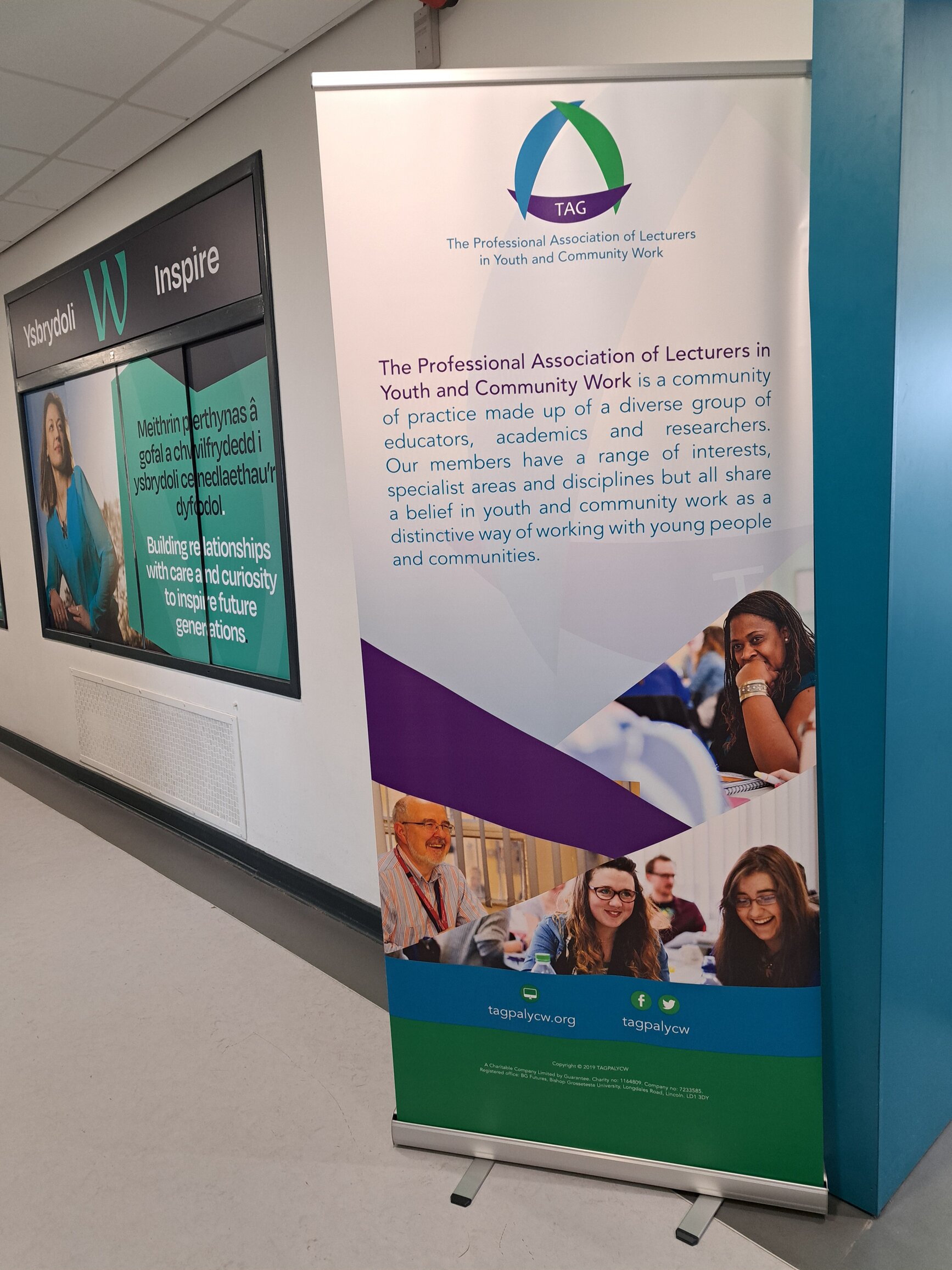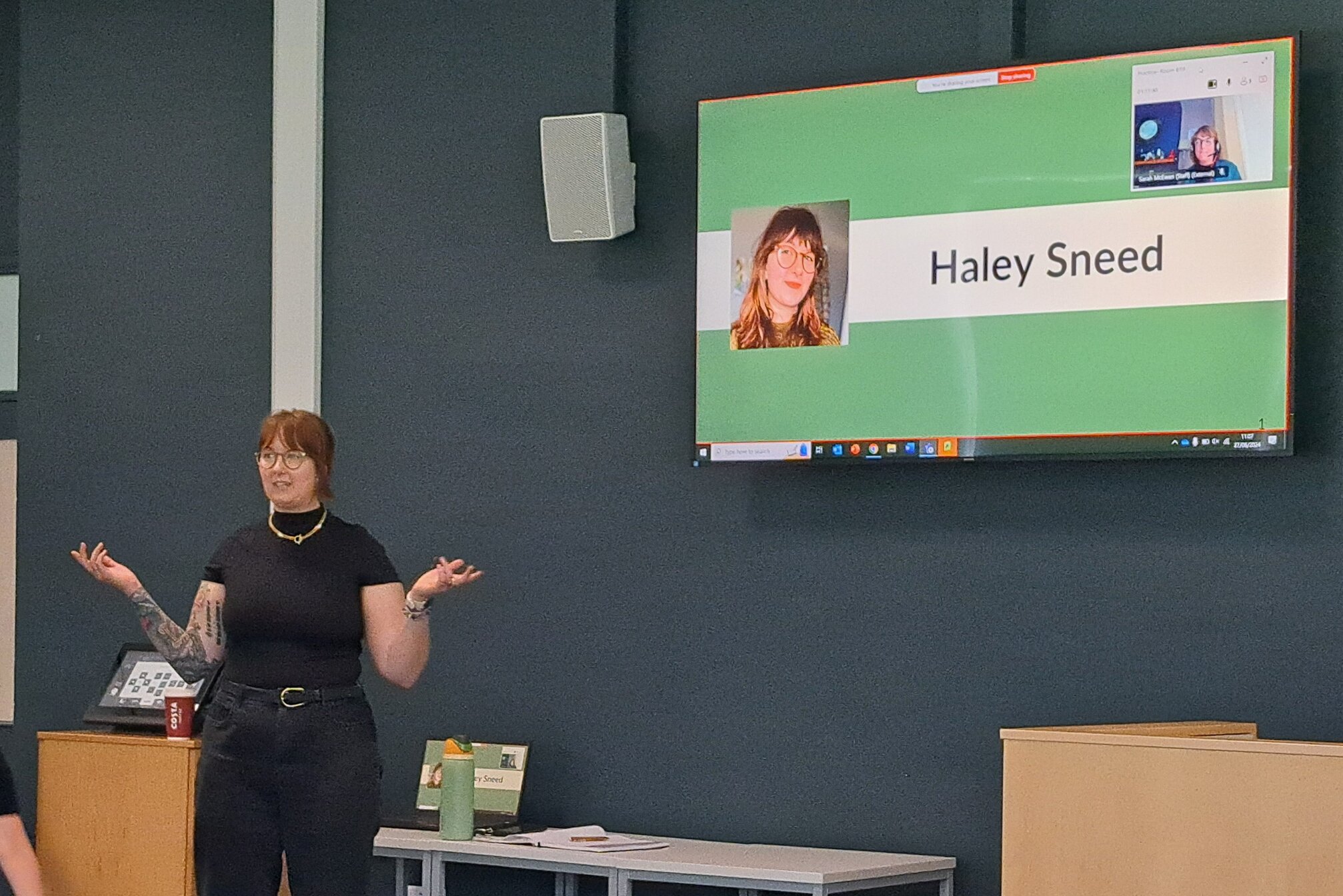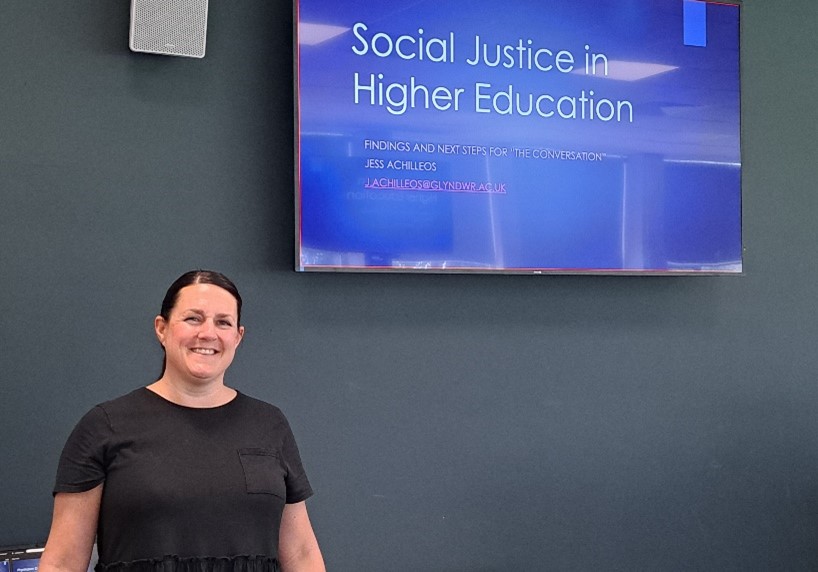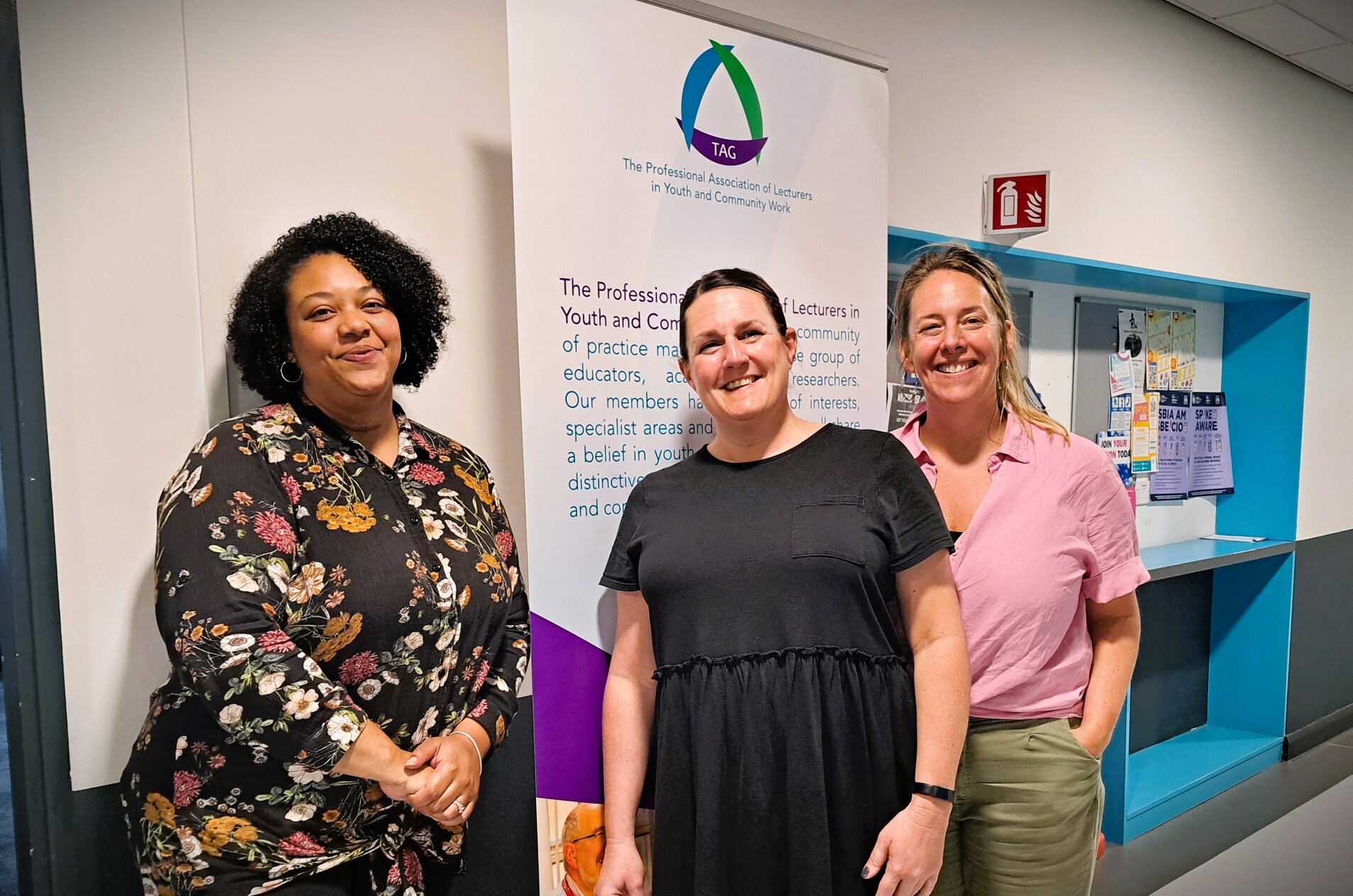TAG Annual Conference, Wrexham University

June 2024
At the end of June, Wrexham University Youth and Community Work Team held the Annual TAG Conference on Wrexham Campus. TAG: PALYC is the Professional Association of Lecturers in Youth and Community Work; a membership organisation that represents the interests of academics, educators, and researchers in the field of youth and community work.

The three days were a huge success, with the opening by Sharon Lovell, Chair for Welsh Government Youth Work Board Wales, and Tim Cortney as the keynote speaker. Day two was packed with research sessions and seminars, all on the theme of ‘Reclaiming the Political Agenda: A Call for Action?’.

Sarah McEwan, University of Dundee
To start one of the parallel sessions, Sarah McEwan from the University of Dundee joined online and introduced delegates to ‘Praxis to lunch seminars.’ Sarah spoke of creating these spaces for critical reflection, referring to deprivation in parts of Dundee and Glasgow where a lot of people were living in deprived areas. The lunchtime seminars were borne out of a partnership between University of Dundee and Dundee City Council to share practice or research with fieldworkers, managers, students, academics, voluntary sectors, and the community.
These sessions were held in community venues to try to avoid the University, especially as the topic is about practice, Human Rights, the Environment, Democratic Innovation, and being a Trauma-Informed community. The events ran successfully with between 12-20 people attending. Sarah also spoke of hoping that the attendees could come along and take more ownership of the sessions rather than being led by an academic.
Sarah explored the impact of providing this space for critical reflection and did this via interview with fieldworkers, students, a community activist, and academics. Sarah talked about the difficulties in working with communities without being affected by current events, and that youth workers often needed to be fluid in their work and work within the dilemmas of their practices. Even though it is hard whilst working within organisations, youth workers are still agents of change if they are critical thinkers. The dangers of not being critical can lead to the loss of connection to initial theoretical underpinnings that can be hijacked by other agendas. If youth workers are not critical, they may prop up existing political injustices.
The findings from the interviews showed that having a space for critical discussion is important, but the physicality of being in a safe space with others was vital, as well as having the time and space to think. Trust, safety to speak, protected time, and supportive challenge were all important facets of these critical reflection spaces. Spaces for this type of engagement have disappeared over time where practice takes priority. Some interviewees talked about not valuing the ‘theory’ side of discussion and just wanting to get on with their practice. Oftentimes there can be a disconnect between the university and practice, where academics can lose touch with practice as well.
Recommendations:
SPACE for critical discussion needs to be a regular thing, embedded into the ethos and culture of organisations. They need to be informal, equitable, safe, and acknowledge power dynamics. There should be a purpose or intention to the discussion.
Haley Sneed, University of Glasgow
Next up in this parallel session was Haley Sneed, from the University of Glasgow presenting on ‘Facilitating Empowerment of Youth Voices’. Lockdown impacted wellbeing and young people's voices are missing; this research addresses the gap in the literature by showcasing youth experience from a youth work perspective.
How can young people's wellbeing be supported in a youth work context post-COVID19? Using a creative methodology, young participants were given cameras and instructed to take photos in their everyday lives within a photovoice project. These photos were then printed and taken to photo-elicitation sessions with the young people as co-researchers. Haley also conducted a vested party questionnaire containing open-ended questions, and interviews with young people. Questions included: how can youth work support my wellbeing? And how has COVID19 impacted my wellbeing?

Haley found that mental health was a big topic, and they took all initial themes from the data and created some calls to action, presented to vested parties at an exhibition, had mental health chats, facilitated art therapy activities, undertook local litter picks, family events, nature trips, created a film group, and anti-bullying workshops – all based on young people’s voices.
The research aimed to work towards empowerment and developing awareness through reflection, and there was emerging motivation and agency from the young people. There was also a Your Voice Event, which invited local businesses and 100 young people to attend, where they could get free haircuts, and enjoy VR racing, to name a few activities. Hayley showed the attendees three fantastic videos around the impact of their work, including a health and beauty youth group, and a community pantry.
Jess Achilleos, Senior Lecturer Youth & Community Work, Wrexham University
The third and final session in this parallel slot was Jess Achilleos presenting on ‘Social Justice in Higher Education’. Jess tells her story of how she got into youth work and the personal dilemma of working within an Institution that has lots of privilege.
Jess asked the question: ‘How do we change the culture?’, which led to the idea of getting academics together with students to have a conversation about these moral and ethical questions. Thus, The Conversation was born.
The Conversation is an ongoing project that provides a space to have difficult conversations in a safe space. It introduces youth work methodology into academia, such as radical pedagogy, because social justice is needed in HE institutions. Radical means doing something a bit different and using informal education and anti-oppressive practices to raise critical consciousness is the ‘different’ way.
The Conversation involves a focus on some pertinent issues in society today, with each session themed around a separate issue, e.g., LGBTQ+, racism, and disability/ableism. It has three parts: the first is a webinar, then a narrative library, and lastly an educational reflection. The session invites openness for conversation about topical issues, providing a space for people to be able to ask questions that they might not feel safe enough to ask outside of the session. It intends to be a safe space for learning and growth.
Jess wants to uncover what actions attendees will take once they have learnt something & feel differently.

Across the day were two other strands of parallel sessions with speakers Tracy Ramsey (Playing Politics: Is youth work a site for political education – Can it be?), Pam Alldred (Affecting Youth Research: Reanimating LGBT+ Youth Accounts), Jane Hickey (Access and Equity in the Classroom - What can Youth and Community Work educators learn from the neurodiversity movement?), John Lockhart (Making academia relevant again), and Alex Drury (Youth work funding review).
Alex presented research on behalf of a research team at Wrexham University, who have been working in collaboration with Trinity St. Davids and Cardiff Met on the Youth Work funding review for Welsh Government. In 2022, the Youth Work Strategy Implementation Board was established to build on the work of the Interim Youth Work Board. The Board published its final report, 'Time to deliver for young people in Wales: Achieving a sustainable delivery model for youth work services in Wales'. The fourth of the Board’s 14 recommendations was that Welsh Government should undertake an independent review into funding and expenditure on youth work services across: Welsh Government, local authorities, voluntary organisations. The review assesses the effectiveness delivery of outcomes and impact for young people. This presentation shared the findings from Phase 2 of the review, published in May 2024.
After lunch, there were research and practice workshops by Simon Williams, Hayley Douglas, and Ian Jones.
Hayley Douglas, Senior Lecturer Youth & Community Work, Wrexham University
Hayley introduced Discourse and Diversity to the delegates in this workshop; it’s not what is being said, but how words are used. Words have power, and Hayley guided an exploration of the ‘how’. So what is Discourse? All Discourse Analysis is political, whether that’s big P political, e.g., language by politicians can portray something in a negative or positive way, or small p political, relationships between individual subjective position to oneself. Uncovering discourses can be intimidating, and Hayley said it was often a choice (a la Matrix!) between taking the blue pill and remaining ignorant or taking the red pill and uncovering unpleasant information.
Next in the session, Hayley introduced a poem called “Wheelchair” by Lois Keith and invited attendees to reflect on their feelings around the writing and the language chosen. Which words stood out? How did their own experience and positionality impact their reading of the poem? What discourses could they identify?
After attendees shared their thoughts and different interpretations of being able bodied and experiences of gender, Hayley introduced an extract of text for them to closely examine the discourse whilst keeping in mind the triangle of Discourse Analysis: language, practice, and context. With several question prompts to initiate reflection, attendees analysed the discourse in the interview extract around Adverse Childhood Experiences and youth work.

Attendees fed back after they examined the extract, noting that the interviewee did not answer the interviewer’s question. There was some discussion of whether the discourse analysis methodology was based on assumptions of what the reader thinks the speaker means, but this is always the case with researching humans, as we can’t ever truly get inside anyone else’s mind. It was concluded that DA was a difficult methodology, and the findings from the analysis inferred that the language used by the interviewee was in contrast to the empowerment model of youth work and was in danger of reinforcing the inequality that it seeks to challenge. Instead, Youth Workers have the opportunity to challenge the status quo and create counter-discourse.
On the final day of the Conference, Youth Work Students from Wrexham University and Nottingham Trent presented their research. Sarah O’Mahony, who recently completed her MA in Youth and Community Work at Wrexham shared the research from her dissertation. This was entitled, ‘Food for thought: What are young people’s perceptions of food insecurity and the youth work response in North-East Wales?’ Sarah outlined how Youth Workers are often at the front line of working with young people experiencing food insecurity, but often the response to provide food (via food banks or cooking sessions) is a sticking plaster for the underlying causes of poverty, and that young people themselves are critically aware of this. Instead, Sarah argued that Youth Workers should be working with young people to feel empowered and participate in democratic processes to bring about political and structural change. Other student presentations focused on ‘Pushing safeguarding back to the core of youth work?’, ‘Voice and Agency - Pushing the Political Will?’, ‘Alternative Methodologies - What needs to change in education?’ and ‘CAMHS - Currently and what next?’
The team said, “We had a great few days. It was really good to bring youth work academics and students together to discuss their current research. The political emphasis was good timing with the general election around the corner and reignited the discussion around youth work an empowering political endeavour”.
If you’re interested in receiving the PowerPoint slides from the Conference, please email Yasmin.washbrook@wrexham.ac.uk.